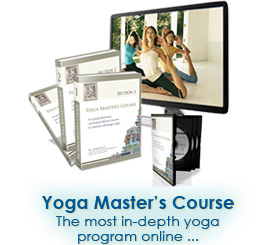[ Excerpt from The Science of Yoga, page 153 ]
There are four traditional branches of yoga under the ancient Vedic system:
1. Jnana Yoga
Jnana (or gnana) means "wisdom." This is the yoga of knowledge, where knowledge is not an intellectual process that comes from books or teaching, but as the consequence of direct experience and intuition—the result of a deep study of the inner life.
Its practice consists of various contemplative and meditative kriyas, with the main objectives being the development of the mind, discernment, and a sharp and pure intellect unclouded by flawed logic and preconditioning. This leads one toward an attitude of detached, impartial witnessing toward the unfolding events of life, and in this way the jnani endeavours to discover the underlying truth behind every lived experience.
This is the yoga of the UPANISHADS, and the yoga that most closely approaches the vedantic philosophy.
2. Bhakti Yoga
This is the yoga of universal love, of abnegation and self-offering to the Supreme; otherwise referred to as the "yoga of devotion."
Here we find the practice of cultivating a humble and devoted service to the Divine, highest nature. The bhakti, through overflowing and indiscriminate, self-less love, breaks the bonds of the ego and experiences the unity of all things.
Bhakti yoga is often associated with religiousness, however, this is not truly the case for the bhakti yogi.
The term bhakti itself simply means "devotion," which can take on a range of forms. A lower mind exhibits bhakti in a classical religious sense. One who is of lower mind (tamasic), for instance, exhibits a crude bhakti in the form of human or animal sacrifice to display love and fear of their God.
The one who is of a distracted, desire-driven state of mind (rajasic) engages in religious ceremony filled with rites and rituals.
The refined, or higher (sattvic) mind, however, displays devotion at the highest, inner levels. This is the bhakti yogi, also known as parambhakti—one who is pure of both mind and body, and disciplined in the inner life.
Thus his/her worship is as the ‘Self within’ worshipping the higher, 'Universal Nature'. Some of the greatest Hindu mystics, such as Jayadeva were bhakti yogis.
Lord Krishna said:
3. Karma Yoga
Karma yoga recognizes that spiritual awareness and evolution can be attained through one's actions in life.
The Bhagavad Gita is the classical text on karma yoga, in which Lord Krishna instructs Arjuna before the commencement of the great battle at Kurukshetra on duty and selfless action.
The karma yogi then, performs his/her actions not out of desire for personal gain, but out of rightness and benefit for all. This consecration of the fruits of one's action to the Divine is what is known as self-less action.
Karma yoga, however, requires more than merely good intensions. One must have right knowledge of their actions and an understanding of the cause and effect relationships (karma).
Unclouded by ignorance, desire and attachment, the karma yogi always performs the right action, at the right time, in the right manner, releasing him/herself from the bonds of the law of karma. In this way, the karma yogi finds liberation through active involvement in the world.
4. Raja Yoga
As mentioned earlier, Raja yoga is classified as one of the four traditional branches of yoga under the vedic system. Within the field of raja yoga, many other of the schools of yoga are considered to reside, all geared toward fusion of the being with the greater macrocosm, or universe, such as Tantra, Mantra, Kundalini, Yantra and Japa Yoga...
[Continued...]
---------------------
NOTE: This yoga article is an excerpt from The Science of Yoga, an online yoga training program with streaming yoga videos and 600 pages of step-by-step yoga instruction.

"The Science of Yoga is a course worthy of
leather binding and an honored place in the
finest libraries in the world
... It is indeed a masterful work."
Dr. John Michael Christian
AwakeningWithYoga.com
Learn More About
The Science of Yoga Course
|






